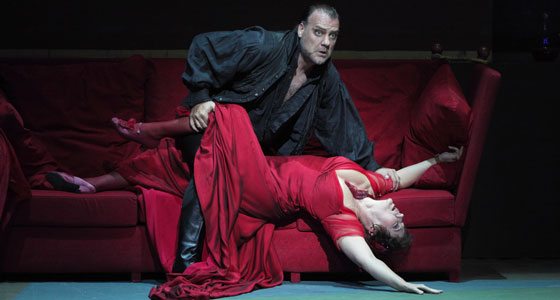
Carmen, Don Juan, and gender reversal: pants roles indeed
HumourEarlier this summer I was listening to the brilliant Graham Forst (husband of the formidable Judith Forst) give a talk on the history of the Don Juan character. He was talking about how Don Juan comes from the concept of Dionysus or Bacchus, these figures of indulgences that sound so fun. Graham was trying to get a feel from the room about what we thought of the character of Don Juan; the answer is strongly. We feel strongly about Don Juan, whether we’re disgusted by or jealous of him. It got me thinking about the notion of a female Don Juan, and whether or not Carmen was the best equivalent. But she’s really not. Her seducing of important men (soldier, bullfighter) is out of a motivation to get more power, or more freedom, and she may even have accidentally fallen in love with Don José along the way. Don Juan already has status and a good amount of power and freedom; his seductions of women are compulsive, immediately self-serving, and they definitely don’t linger in his mind afterwards (if he can help it). It struck me that the idea of sexual conquest generally means a man convinced a woman to sleep with him. It’s not the same “chase” from woman to man; Carmen, in order to become a Doña Juan, wouldn’t really have to do much, and she’d sadly get shoved out of society for being a harlot faster than anyone could admire her determination.
So that’s a semi-serious precursor to where my mind went after pondering Don Juan and his ally, Carmen. I started thinking about how mental some opera plots would be if their characters’ genders were reversed. Like, how pathetic would The Bartered Groom be? Or how about a super weird male Manon? Since this is, after all, the supposed “age of the director”, here are a few examples that make me curious to see these switcheroo versions on stage:
1. Tosca

Rome’s most celebrated tenor, Tosco, has a girlfriend who paints (and who sometimes helps her friends escape prison), Maria. The powerful (yet lonely) police chief, Madama Scarpietta, comes by to blackmail the tenor (she’s secretly in love with him and hates his activist girlfriend), telling him she’ll torture his girlfriend unless he agrees to marry Scarpietta instead. It’s still pretty dark, eh? Although when Scarpietta comes to force herself upon Tosco, it could be hard to sell the gravity of that scene to the point of Tosco stabbing a lady. Unless Scarpietta is very Kathleen Turner in Californication.
2. Der Rosenkavalier

I suppose this one could still work. Octavian becomes Octavia, a young socialite lady, torn between her passionate affair with an older man, and this hot young guy that she’s supposed to marry (he turns out to be really funny). The arranged marriage portion of the story wouldn’t be so odd, with a woman caught in the middle of it all. The opening scene with Octavia and her older lover might come across a little suspicious (“Wie du warst”, are you sure?), but the idea of a young woman leaving an older man for a younger one might even be more sad than Rosenkav: the Original.
3. La traviata

A high-class male escort (Il traviato) has a clingy (and wealthy) female client, and he ends up falling for her. They run off to the country and have a great time until the female client’s crazy mother comes with her Bible and her guilt trip. The mother shames the male escort for corrupting her good little daughter, and convinces him to leave her. Meanwhile, male escort has health problems, and his favourite client runs back into his arms just in time to see him succumb. The mother kind of feels bad. See, this story is _so sad _no matter what.
4. Così fan tutte

Two girls are hideously insecure about their relationships with their boyfriends, so they set them up and try to catch them cheating. It’s very Cameron-Diaz-and-Christina-Applegate-in-The-Sweetest-Thing. Very Romy and Michele. And I hope their boyfriends _do _cheat; these guys deserve girls who aren’t insecure messes, even if they are Albanians.
5. Madama Butterfly

Entitled American tourist Miss Pinkerton sails over to Japan for kicks, finds herself a hot Japanese guy (budding sumo wrestler, to cling to the stereotype?) to hang out with, gets pregnant by him and takes off. She comes back three years later with her new American husband, demanding child-support payments from Signore Butterfly. That woman would be just as horrible as Pinkerton himself; the idea of a lonely man, estranged from his son by his awful baby-mama is just so pathetically sad. Puccini, eh?
Runners Up:
Let’s not neglect the heartbreak that could come from an Ugly Betty-type Alberta Herring, with her pretty best friend who’s dating the guy Alberta likes. Le nozze di Figaro would oddly be creepier than it is already, with a psycho lady of the house who has this weird thing where she _has to _sleep with all her male staff. The psycho house-mistress also has an emasculated husband, who gets either neglected or treated like dirty. And Lulu. If Lulu were some lithe, destructive dude, he would be at best a skewed version of Don Juan, and at worst, a gay attention whore.
Operatic shower thoughts on this Friday morning.


Comments